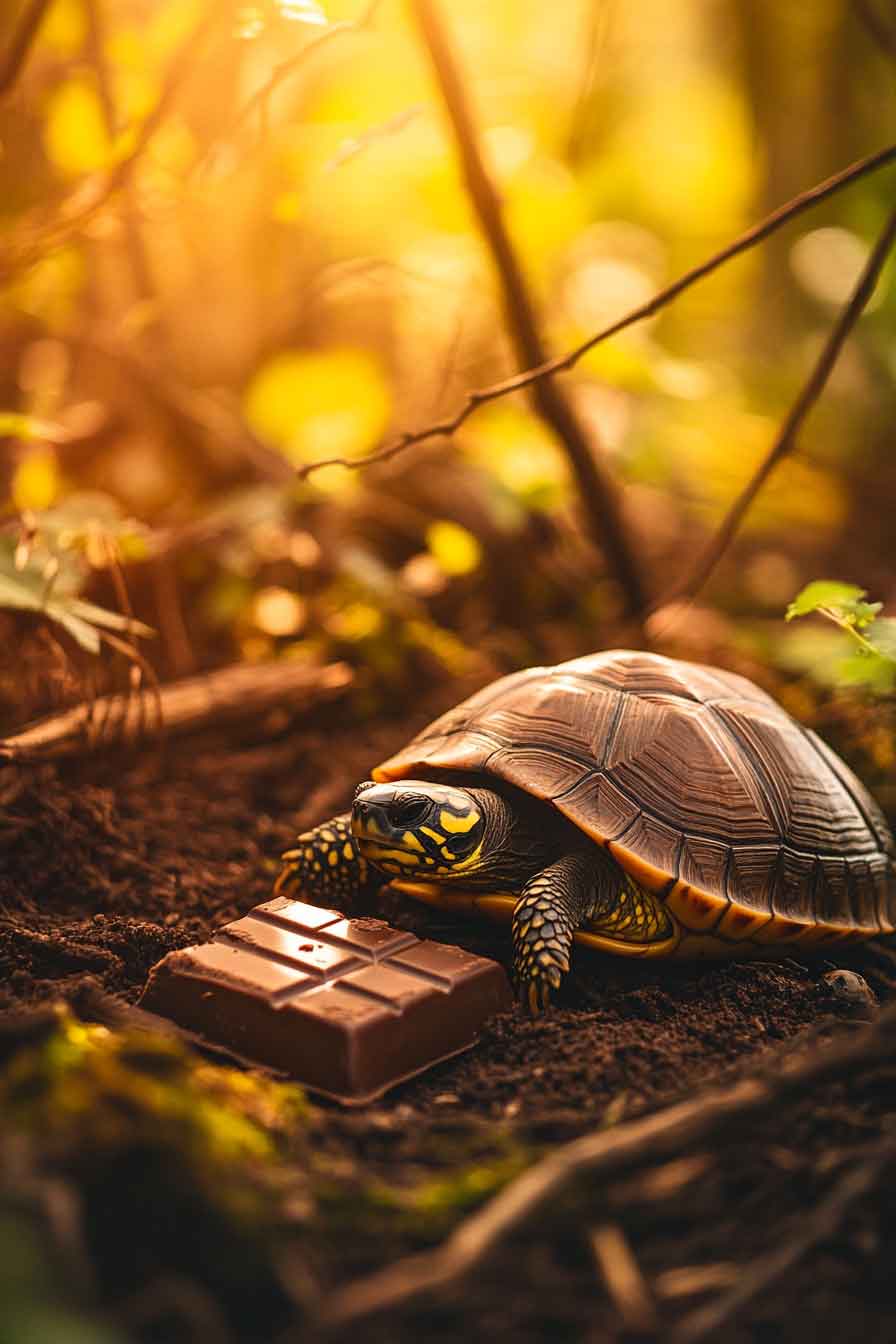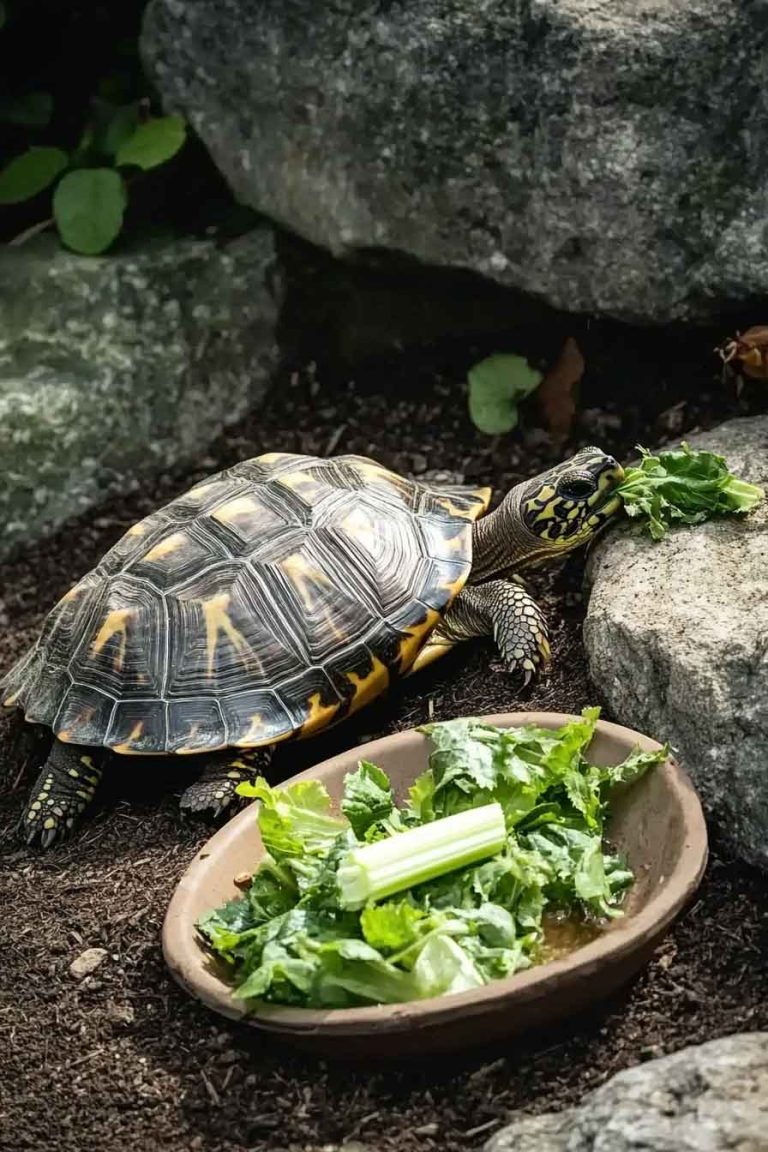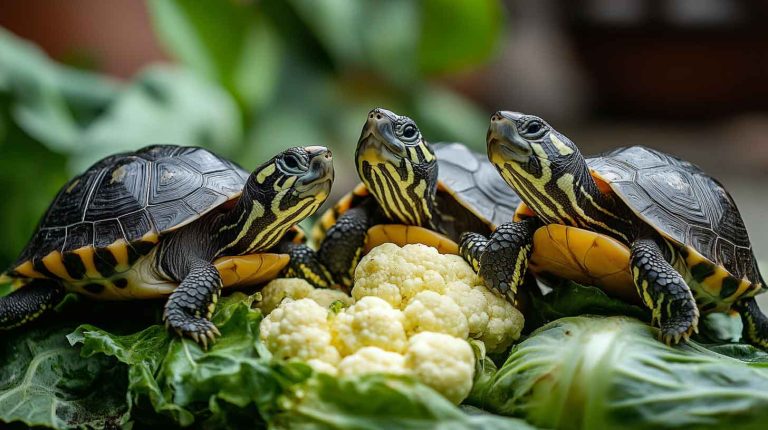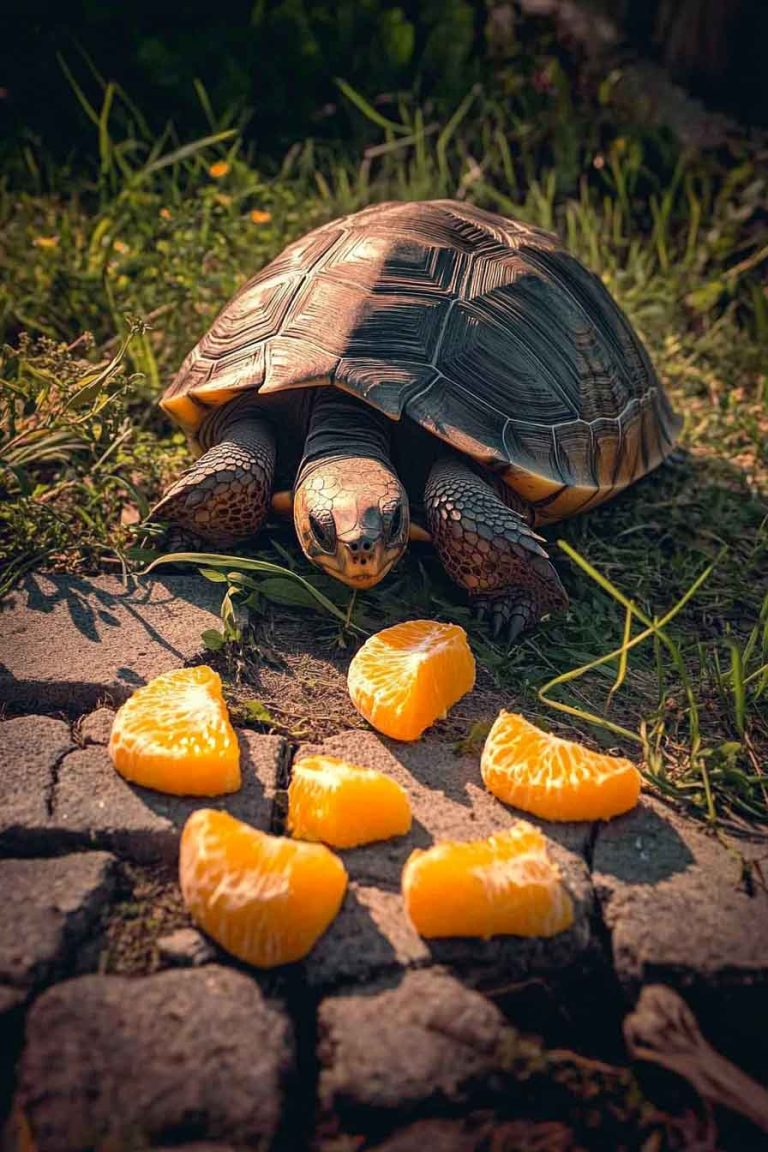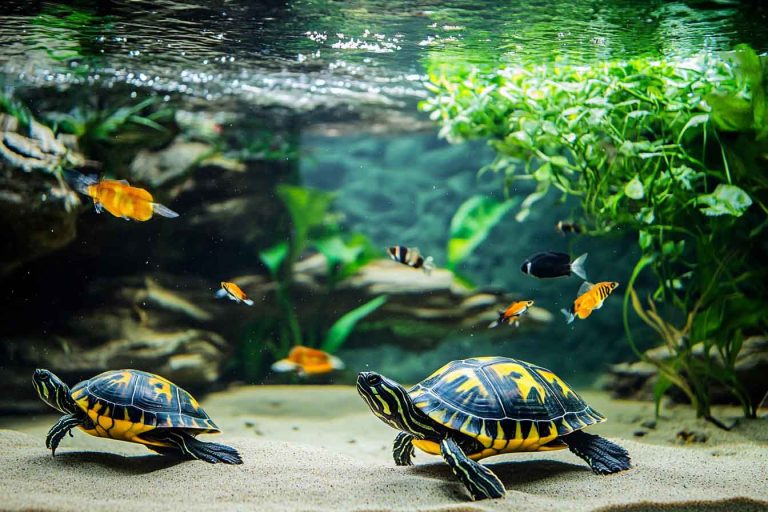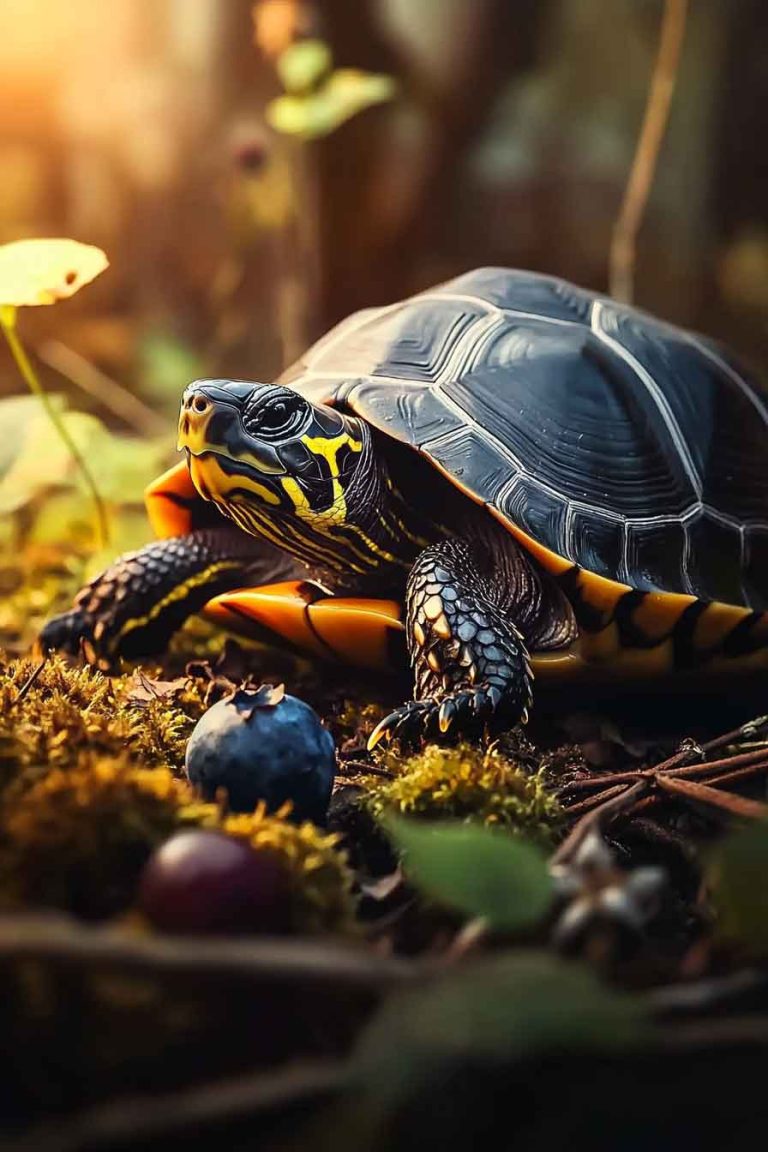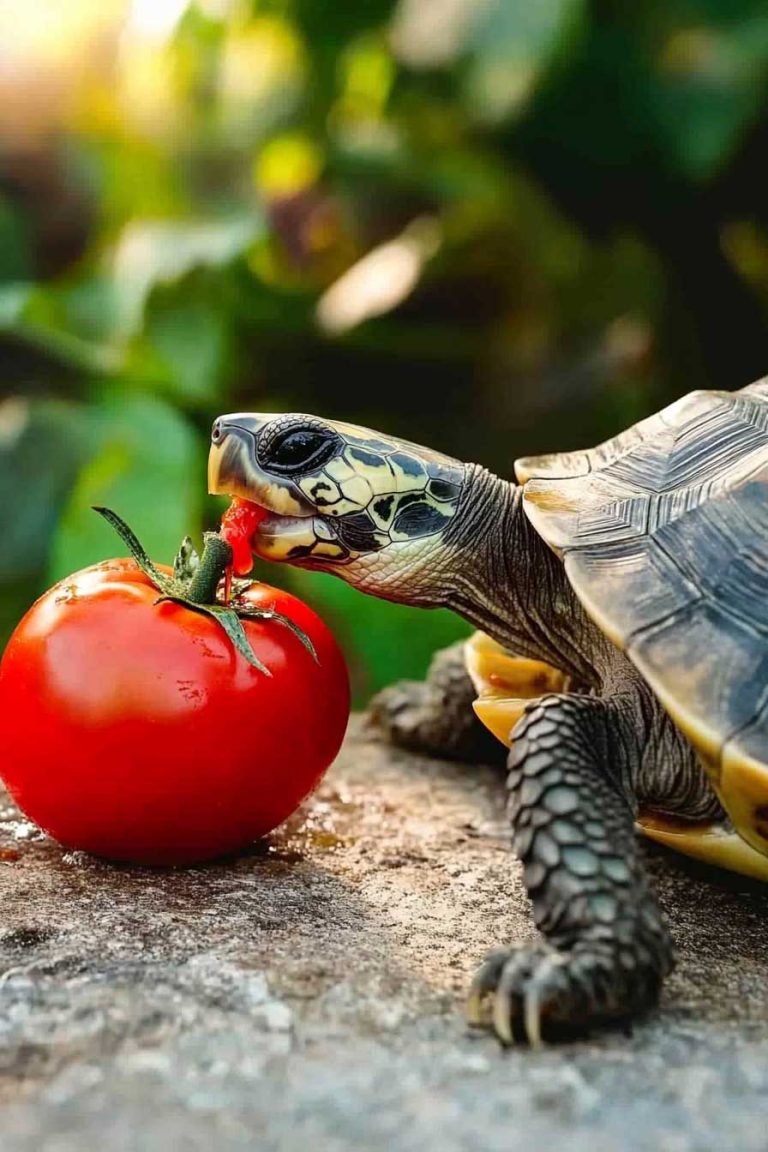Can Turtles Eat Chocolate? Dangers, Symptoms & What to Do
I’ll be honest — when I first started caring for turtles, I had a lot of questions about what they could and couldn’t eat. One day, while I was snacking on a piece of dark chocolate, my turtle came up to the glass, watching me like he wanted some. That moment made me wonder: “Can…
I’ll be honest — when I first started caring for turtles, I had a lot of questions about what they could and couldn’t eat. One day, while I was snacking on a piece of dark chocolate, my turtle came up to the glass, watching me like he wanted some. That moment made me wonder: “Can turtles eat chocolate, even just a small bite?”
So, can turtles eat chocolate?
No — turtles should never eat chocolate. Not even a little. Chocolate is highly toxic to turtles. It contains ingredients that their bodies cannot break down, and even a tiny amount can be dangerous or even deadly.
In this post, I’m going to walk you through exactly why chocolate is off-limits, what’s inside chocolate that makes it harmful, and what the experts say about how it affects a turtle’s system — based on real research and reptile health sources.
Can You Feed Chocolate to Your Pet Turtle?
The short and clear answer: Absolutely not.
Chocolate might be one of the most dangerous human foods you could ever give a turtle. Even a small crumb can create serious health problems. I never take any chances — I don’t let chocolate anywhere near my turtle’s tank.
So, why is it so bad?
The Two Big Dangers in Chocolate:
- Theobromine
- Caffeine
Both of these are methylxanthines — chemical stimulants that affect the heart, brain, and muscles. Humans can tolerate them because we metabolize them quickly. But turtles? Their metabolisms are slow. That means even a trace amount stays in their system far too long.
These compounds are absorbed into a turtle’s bloodstream and can cause:
- Tremors or seizures
- Abnormally fast heart rate
- Muscle spasms
- Organ stress (especially liver and kidneys)
- Coma or death in severe cases
I once read a vet case about a red-eared slider that got into a single chocolate chip. It didn’t go well — the turtle needed immediate medical care, and even then, its recovery was slow and stressful.
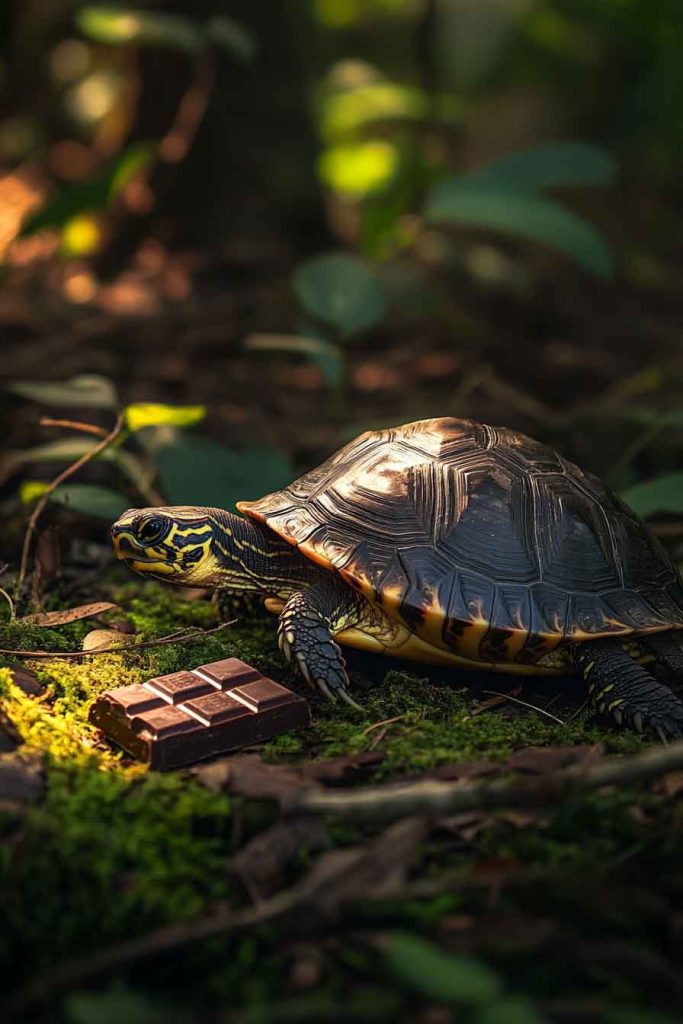
What’s in Chocolate That Makes It So Dangerous?
To understand how risky chocolate really is, here’s a breakdown of what’s inside 100 grams of dark chocolate:
- Theobromine: 450–600 mg
- Caffeine: 40–80 mg
- Sugar: 45–50 g
- Fat: 30–35 g
- Phosphorus: ~200 mg
- Calcium: ~56 mg
- Magnesium & Iron: Moderate to high
- Oxalates: Present — can block calcium absorption
Even in small pieces, the amounts of theobromine and caffeine are far too high for a turtle to handle. Plus, chocolate is also loaded with:
- Sugar — which turtles don’t process well
- Fat — which can strain their liver and digestion
- High phosphorus — which disrupts the calcium balance needed for healthy shells
- Oxalates — which bind to calcium and make it unusable in the turtle’s body
All of this adds up to one big fact: chocolate offers zero benefit to turtles and poses multiple threats.
What Happens If a Turtle Eats Chocolate?
I hope this never happens to your turtle — but if it does, you need to act fast.
Turtles are much smaller than us. Their organs and systems are delicate, and they process food slowly. So, even a tiny bit of chocolate can hit their system hard. If your turtle has accidentally eaten chocolate, don’t wait — it could quickly turn serious.
Here’s what I learned from talking to a reptile vet and reading expert sources.
Symptoms of Chocolate Poisoning in Turtles
Toxic reactions can start within just a few hours, and symptoms may include:
- Lethargy or unusual stillness
- Loss of appetite
- Twitching or tremors
- Paddling in circles or erratic swimming
- Rapid breathing or heavy gasping
- Vomiting or regurgitation (in rare cases)
- Seizures or full-body spasms
- Coma or unresponsiveness
I’ve seen similar symptoms when a friend’s turtle ate a piece of chocolate-covered cereal that fell near the tank. The turtle seemed fine for about a day — then suddenly became sluggish and started shaking. They had to rush it to an emergency exotic vet.
If your turtle eats chocolate, don’t wait for symptoms to start. Immediate care is critical.
What To Do If Your Turtle Eats Chocolate
Here’s what I’d do — and what most reptile vets recommend:
- Call a reptile/exotic vet right away.
Not all regular vets handle turtles. Find a local exotic vet who treats reptiles and call them as soon as possible. - Don’t try to force vomit.
Unlike dogs, you can’t safely induce vomiting in turtles at home. It can cause more harm. - Move the turtle to a quiet, safe place.
Keep them calm, warm (within their normal basking temp range), and hydrated. - Provide water access.
Some turtles will instinctively soak or drink. This may help dilute the toxin slightly. - Monitor for symptoms.
Even if no signs appear right away, internal damage could still be happening. Watch closely for 24–48 hours and follow all vet instructions.
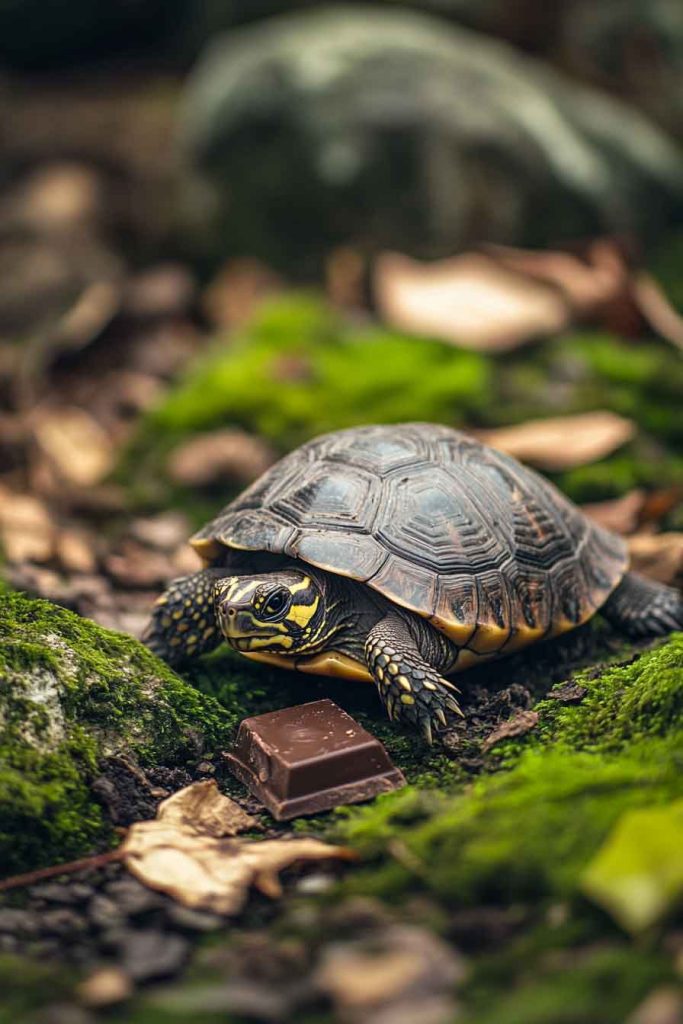
Are Some Turtle Species More at Risk?
While all turtles are sensitive to chocolate, some may be more vulnerable due to their size, diet, or metabolism:
Red-Eared Sliders & Painted Turtles
These semi-aquatic turtles are often more curious and might nibble on anything dropped near the tank. Since they are smaller in size (especially juveniles), the effects of chocolate can be much more severe.
Box Turtles
Box turtles are omnivores and often hand-fed — making them more likely to accidentally ingest chocolate from a dropped snack or treat. Because they live on land and eat slowly, the chocolate may stay in their digestive system longer, causing prolonged exposure.
Musk, Mud, and Snapping Turtles
These turtles may be less likely to approach human food, but if they do eat chocolate, the danger is just as high. Their carnivorous diet gives them no tolerance for sugars, dairy, or stimulants.
Frequently Asked Questions (FAQs)
Can Turtles Eat White Chocolate or Milk Chocolate?
No. All types of chocolate — dark, milk, white — contain harmful ingredients. While dark chocolate has more theobromine and caffeine, milk and white chocolate still contain sugar, dairy, fat, and preservatives, which turtles cannot digest properly. None are safe.
What If My Turtle Ate Chocolate Days Ago and Seems Fine?
Even if your turtle looks okay now, internal damage might still be happening. Turtles hide illness well, and symptoms sometimes take days to show. I’d recommend calling a vet to be safe, especially if your turtle is acting differently or refusing food.
Can Tortoises Eat Chocolate?
Absolutely not. Just like turtles, tortoises cannot digest chocolate and are vulnerable to toxic reactions. Even a bite of a cookie or candy bar can lead to poisoning. Keep chocolate far away from all reptiles.
Can I Feed My Turtle Chocolate-Flavored Foods?
No. Even foods that are flavored with chocolate or cocoa powder may contain traces of theobromine or caffeine. Plus, chocolate-flavored snacks usually have added sugars, fats, and artificial chemicals. Stick with clean, whole-food treats instead.
Safe Treat Alternatives to Chocolate
If you want to spoil your turtle a little — do it the healthy way! Here are some safe, turtle-friendly treats I use instead:
- Chopped strawberries or blueberries (very small amounts)
- Romaine lettuce or dandelion greens
- Boiled egg (tiny pieces, no seasoning)
- Mealworms or shrimp (for omnivorous turtles)
- Commercial turtle treats made with dried insects or veggies
Just remember: even safe treats should only be a small part of your turtle’s overall diet.
Conclusion
So, can turtles eat chocolate?
No — never. Not even a little.
Chocolate is one of the most toxic things a turtle can eat. The theobromine, caffeine, sugar, and fat inside it are all dangerous — especially for reptiles, who digest food slowly and react differently than mammals.
As a turtle owner, the best thing you can do is keep chocolate far away from your turtle’s environment, and educate others (especially kids) about why sharing sweets with reptiles is never a good idea.
If you ever suspect your turtle ate chocolate, don’t panic — but don’t wait either. Call a vet, act quickly, and protect your shelled friend.
Thanks for reading! If your turtle ever had a chocolate scare — or you’ve got tips on keeping treats safe — share your experience in the comments. Let’s help each other keep our turtles healthy and happy.

